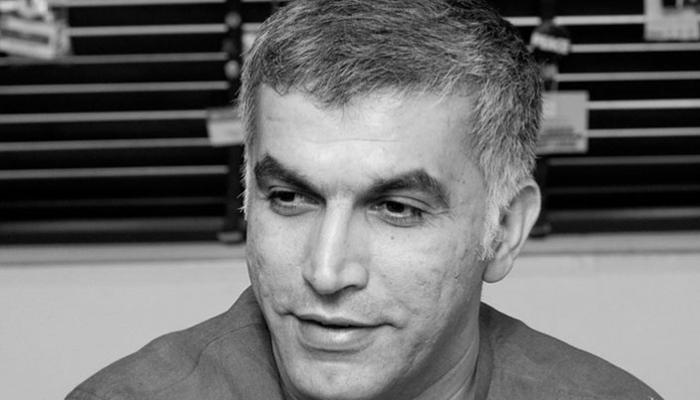[vc_row][vc_column][vc_column_text]
Bahrain’s criminal court today postponed Index Award winner Nabeel Rajab‘s trial to 28 December, when he is expected to be sentenced. The Bahrain Institute for Rights and Democracy spoke to Rajab’s family, who state that today’s trial last 15 minutes, and the judge refused to allow Rajab to speak. Rajab’s pretrial detention, which began with his arrest in June 2016, continues.
The postponement comes a week after British Prime Minister Theresa May and Foreign Secretary Boris Johnson courted Gulf leaders in Bahrain, both failing to raise human rights in their public speeches, just days afters an appeals court upheld the 9-year sentence of political opposition chief Sheikh Ali Salman. The Bahrain Institute for Rights and Democracy and Index on Censorship, alongside other partners, have called on the UK to call for Nabeel Rajab’s release.
Sayed Ahmed Alwadaei, Director of Advocacy, Bahrain Institute for Rights and Democracy: “This is a farcical trial which represents the human rights crisis facing the Gulf. Bahrain’s allies, in particular the US and UK, must publicly call for his release. In particular, the UK has still not called for his release, nor used its leverage to help this clear human rights violation. Failing to do so will help perpetuate injustice, which undermines any potential long-term stability.”
Husain Abdulla, Executive Director, Americans for Democracy & Human Rights in Bahrain: “Nabeel Rajab’s ongoing trial is a reprisal against both him and the entire human rights community in the region. The US should suspend arms sales to Bahrain. The State Department called for his release, but mere words without leverage has so far proved ineffective. Next steps need to be taken.”
Melody Patry, senior advocacy officer, Index on Censorship: “Bahrain’s repeated postponement of Nabeel Rajab’s trial is emblematic of its wider approach to the human rights of its citizens. Arbitrary trials, extra-judicial detentions and outright stripping of citizenship are the Bahraini government’s favourite weapons to silence dissenting voices. Nabeel’s continuing detention is unjust, cruel and a blatant violation to his right to freedom of expression. We call on Bahraini authorities to release him immediately and unconditionally.”
Nabeel Rajab, the president of the Bahrain Center for Human Rights, is being prosecuted on multiple charges of “disseminating false rumours in time of war”, “insulting a neighbouring country” and “insulting a statutory body” under articles 133, 215 and 216 of the penal code. These are in relation to remarks he tweeted and retweeted on Twitter in 2015 about the humanitarian crisis caused by the Saudi-led war in Yemen – with Saudi Arabia the “insulted” country – and documenting torture in Bahrain’s Jau prison. He was first expected to be sentenced in October 2016, but the court instead reopened his case for investigation. In doing so, the court indicated that it had no proof to convict Rajab on, yet refuses to acquit him.
In September, Bahrain’s prosecution brought new charges against him for “undermining the prestige of the state” after the New York Times published his opinion piece, Letter from a Bahraini Jail. This charge could add another year to his sentence. In his letter, Rajab wrote: “No one has been properly held to account for systematic abuses that have affected thousands.” The BCHR estimate around 4000 political prisoners in the country. Rajab also asked: “Is this the kind of ally America wants? The kind that punishes its people for thinking, that prevents its citizens from exercising their basic rights?”
Rajab has been in pre-trial detention since his arrest in June 2016. This extended detention, much of it in solitary confinement, has caused a deterioration in his health, according to his family. The United Nations Standard Minimum Rules for Non-custodial Measures state that “pre-trial detention shall be used as a means of last resort in criminal proceedings, with due regard for the investigation of the alleged offence and for the protection of society and the victim.”
The US has called for Rajab’s release “full stop”, and the EU’s top human rights official yesterday expressed his “hope” for Rajab’s release. In September, the UN High Commissioner for Human Rights used his opening statement at the 33rd session of the Human Rights Council to warn Bahrain: “The past decade has demonstrated repeatedly and with punishing clarity exactly how disastrous the outcomes can be when a Government attempts to smash the voices of its people, instead of serving them.”
The United Kingdom and Bahrain
Pressure mounted this week on the Prime Minister to call for Nabeel Rajab’s release. While Theresa May told parliament at Prime Minister’s Questions this week that “We do raise the issue of human rights when we meet the Gulf states”, the UK Government has never publicly called for the release of any prisoners of conscience in Bahrain.
On Tuesday 14 December, 23 MPs penned a joint letter to the Foreign Secretary calling on the UK Government to demand the “unconditional release” of Nabeel Rajab from prison, and for the charges against him to be dropped. The letter signed by a cross-party group of MPs from the Conservatives, Labour, Scottish National Party, DUP, Liberal Democrats, Green and SDLP, urges the UK Government to follow the lead of the US State Department, the European Parliament, and the United Nations, in calling for Bahrain to release Mr Rajab. The letter said: We urge you, in advance of the trial tomorrow, to make it clear to Bahraini officials that the United Kingdom wishes to see his unconditional release from prison, and for the charges brought against him, which are related to his right to freedom of expression and freedom of speech, to be dropped.
On the same day, rights groups including Index on Censorship and the Bahrain Institute for Rights and Democracy protested outside Downing Street and delivered a letter to the Prime Minister.
Theresa May was in Bahrain last week to set out her new “bold vision” for British-Gulf relations. Human rights was not mentioned in her speech to Gulf leaders, nor by Foreign Secretary Boris Johnson, who was also in Bahrain for a separate security conference.
The Bahrain Institute for Rights and Democracy and Index on Censorship, along with three NGOs also wrote a letter to the Prime Minister: “There is nothing bold in silence over clear human rights violations, and we urge you to now make a public call for Nabeel Rajab’s immediate and unconditional release.”
Further information
This is the latest in a long-running series of cases against Rajab. He had previously been arrested and sentenced in 2012 for his expression. Following his release from Jau Prison in 2014, he went on an advocacy tour of Europe, including to London and Brussels, and participated in the 27th Session of the UN Human Rights Council. On 1 October 2014, he returned to Bahrain, where police arrested him at the airport. He was charged and prosecuted for “insulting” the Ministries of Interior and Defence. This was in relation to a tweet he wrote calling these ministries had acted as an “ideological incubator” for terrorist ideologies, after it that Bahraini ISIS recruits had previously worked in these institutions. Rajab was released on bail a month later, but banned from travel – a ban which remains to date.
In January 2015, a Bahraini court sentenced Rajab to six months in prison, and released him on bail while he appealed the conviction. But he was rearrested in April 2015, when he was charged with two of the three charges he was convicted on today: insulting a statutory body and spreading rumours in war time. Rajab remained in police custody until July 2015, when he received a pardon for the six month sentence. However, despite Rajab’s July 2015 pardon, the charges and travel ban continued to be held against him. In his Letter from a Bahraini Jail, he revealed to the New York Times the threats brought against him: “The head of the cybercrimes unit at the Criminal Investigation Directorate in Bahrain summoned me and my family to a meeting, where — in front of my children — he warned me that if I didn’t stop my advocacy work, I would face up to 15 years in prison.”
Rajab was arbitrarily arrested on 13 June 2015, on the opening day of the UN Human Rights Council’s 32nd Session. His arrest coincided with travel bans on activists, the forced exile of Zainab Al-Khawaja under threat of rearrest, and the dissolution of the Al Wefaq political society.
Following this June arrest, Rajab was prosecuted for the two charges first brought in April 2015, with a new third charge of “insulting a neighbouring country” – Saudi Arabia. Tweets used as evidence against Rajab, seen by BIRD, include documentation of torture and retweets of Amnesty International, Human Rights Watch and Index on Censorship messages.
Rajab was held in solitary confinement for the majority of his pre-trial detention, transferred between West and East Riffa Police Stations. After 15 days in solitary, on 28 June 2016 Rajab required urgent medical attention, after losing a lot of weight and developing an irregular heartbeat and immune system deficiencies. He was transferred back to police custody the following day.[/vc_column_text][/vc_column][/vc_row][vc_row][vc_column][vc_basic_grid post_type=”post” max_items=”4″ element_width=”6″ grid_id=”vc_gid:1481792118745-8ab3d315-aca2-3″ taxonomies=”3368″][/vc_column][/vc_row]





